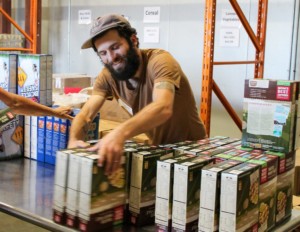Keeping Neighbors Healthy and Nourished in the Wake of the Coronavirus
By John Sayles, CEO of the Vermont Foodbank
 At the Vermont Foodbank, we are laser-focused on our response to the coronavirus (COVID-19) and its implications for our community. Not everyone has the luxury of stocking up on the recommended two weeks of food to prepare for the need to quarantine. And food budgets will suffer as individuals forgo hourly wages to quarantine or face leave-without-pay if their place of employment sees a slowdown in business or must shut down. Food will be an increasingly critical need in the coming weeks and months, and we stand ready to serve.
At the Vermont Foodbank, we are laser-focused on our response to the coronavirus (COVID-19) and its implications for our community. Not everyone has the luxury of stocking up on the recommended two weeks of food to prepare for the need to quarantine. And food budgets will suffer as individuals forgo hourly wages to quarantine or face leave-without-pay if their place of employment sees a slowdown in business or must shut down. Food will be an increasingly critical need in the coming weeks and months, and we stand ready to serve.
We are following the health experts’ advice and focusing on keeping our communities healthy and safe. In this confusing and turbulent time, the Vermont Foodbank is focused on the core mission – making sure that our neighbors who are vulnerable to hunger have enough nourishing food to eat to remain healthy –kids who are no longer in school, parents who can’t work, older Vermonters who are justifiably worried about contact with others. So what’s the plan, and how can people help?
We are closely monitoring the situation, putting contingency plans in place, and planning for increased and shifting community needs. We are in regular communication with our network of 215 partners across the state (food shelves, meal sites, senior centers, homeless shelters and out of school programs) providing guidance for how best to meet the growing and shifting needs of our community during this time while preventing the spread of the virus. We will need to serve more people than ever before, while changing the way we work to ensure that food is shared in ways that limit the spread of the virus.
In addition to maintaining our usual food distribution across the state, we are purchasing the equivalent of an extra two to three months’ worth of nutrient-dense, pantry staples for the 12,000 people we serve monthly at schools, hospitals and low-income senior housing. We are looking in to doubling up on our distribution of free, nutritious foods to 2,200 low-income older adults through the Commodity Supplemental Food Program. We are hoping to provide both the April and May food boxes in April. This will ensure that if services are disrupted due to the virus, people don’t miss out on food.
Systems are shifting. People usually choose food as though “shopping” at their local food shelf, but now many of our partners will transition to offering prefilled bags and boxes that can be distributed with a lower risk of virus transmission. The Foodbank is already ordering additional food, boxes, bags, and to-go containers to support these efforts. Organizations that provide community meals are shifting to models that allow them to share food with neighbors in need without people congregating. Many senior centers and meal programs will make prepared food available to-go, so that it can be picked up or delivered and eaten at home. Schools are working hard to prepare to distribute school meals to students while the schools are closed, and we are working closely with these partners to ensure that our services that operate in partnership with the schools are still able to meet the needs of our community members in these changing times.
To make these shifts and step up to help the community it takes everyone – individuals, organizations, and government – working together. So, what can you do?
- Follow the guidelines from the Center for Disease Control to limit the spread of the virus.
- If you need help, reach out. We are all in this together and nothing is more important to keeping health and reducing stress than proper nutrition. Find your local food shelfor call the Vermont Foodbank at 1-800-585-2265.
- Food will continue to be a critical need for the people we serve as they prepare for the possibility of a local outbreak. You can help ensure that all our neighbors have the food they need to maintain their health by donating to the Vermont Foodbank.
To ensure we can most efficiently meet the needs of the community as the situation continues to evolve, we encourage individuals to donate funds rather than product to support this effort.
I still vividly remember tropical storm Irene with its striking devastation and the amazing resilience shown by Vermonters in recovery. This is a storm that may last for months, and we’ll get through this too by working together.
Learn more about the Vermont Foodbank’s response to the coronavirus here.
